Should pregnant women have root canal treatment? Signs of root canal inflammation in pregnant women? Precautions for pregnant women after root canal treatment? What should pregnant women avoid eating after root canal treatment? How to treat root canal inflammation in pregnant women. Let’s explore this with Bedental through the article below.
What is root canal treatment?
Root canal treatment (or endodontic treatment) is a dental procedure to address issues related to the dental pulp – the area containing pulp tissue and nerves of the tooth. This process is only performed when the dental pulp is inflamed, infected, or severely damaged due to deep cavities, bacteria, or trauma.
The typical process of root canal treatment includes the following stages:
- Anesthesia: The dentist will use anesthesia to numb the area around the tooth and surrounding structures. This helps alleviate pain and discomfort during the treatment.
- Accessing the dental pulp: The dentist will use dental instruments to drill and create an opening into the root canal. This process involves removing the entire pulp tissue and drilling a small hole deep into the root canal system.
See more: Why do children have bad breath
- Root canal cleaning: The dentist will use dental instruments to remove all or part of the pulp tissue and nerves from the root canal system. This process ensures the removal of any infected or necrotic tissue.
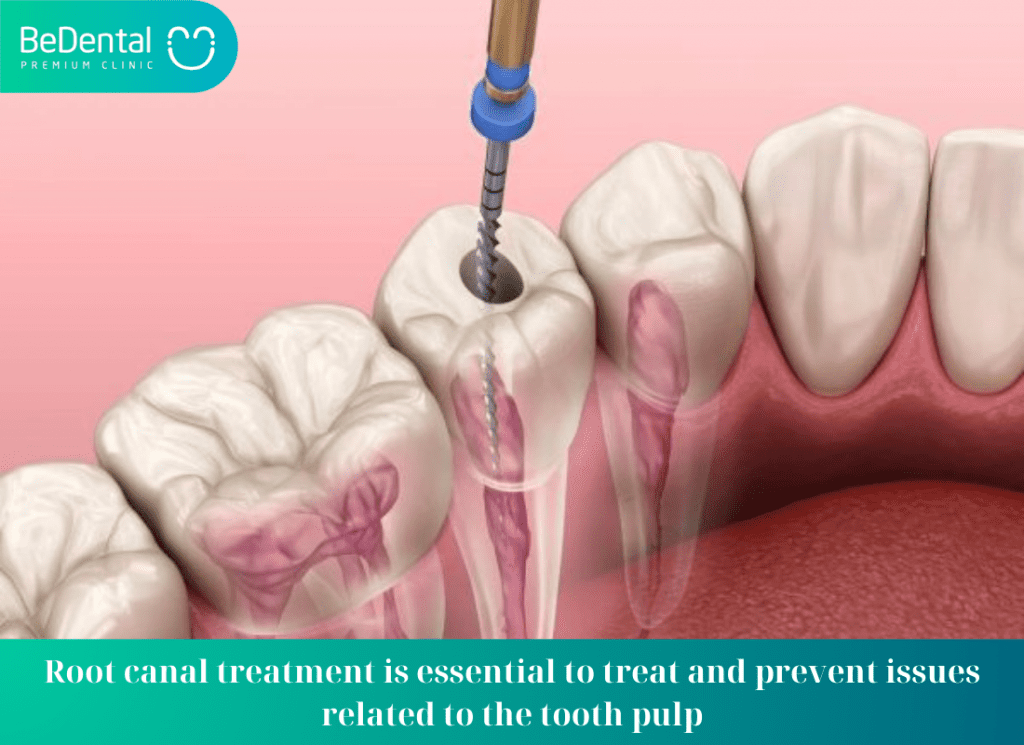
- Cleaning and disinfection: After removing the dental pulp, the dentist will thoroughly clean the tooth roots and root canal system with a disinfectant solution to eliminate bacteria and plaque that can cause inflammation.
- Sealing the root canal system: Once the root canal system has been cleaned and disinfected, the dentist will use a specialized sealing material to fill and protect the root canal system from bacterial infection. In some cases, additional reinforcement with a post may be necessary to ensure the strength and stability of the tooth.
- Placing a temporary filling: In some cases, the dentist may place a temporary filling on the tooth to protect it and help complete the filling process after the dental pulp removal.
After root canal treatment, you will need to visit the dentist to continue the filling process by placing a protective layer or a crown to protect the tooth. Root canal treatment helps protect the tooth and prevent bacteria from spreading quickly to the surrounding tissues. However, this process does not require additional care and monitoring after treatment.
See more: The process of root canal treatment
Is root canal treatment painful?
Root canal treatment is performed under the effect of anesthesia, so patients do not feel pain throughout the treatment. Before performing root canal treatment, the dentist will use anesthesia to numb the tooth and surrounding structures to reduce pain and discomfort.
However, after the effect of anesthesia wears off, you may feel some discomfort, including intense pain or sensitivity during the treatment. Pain and discomfort typically last for a short time and can be treated with over-the-counter pain medication recommended by the dentist.
Additionally, if you have severe infection or significant damage to the dental pulp, a more complex root canal treatment may be necessary, which can cause some discomfort. In specific situations, the dentist will provide necessary advice and instructions to help reduce pain and discomfort.
Note that each root canal case is different, and the level of pain and discomfort may vary. For accurate and reliable information, it is best to talk to your dentist before and after treatment to learn more about the root canal process and pain management.
Signs of root canal inflammation in pregnant women
Root canal inflammation is a condition of infection in the root canal system when bacteria attack the blood vessels and tissues around the dental pulp. Some signs of root canal inflammation in pregnant women include:
- Toothache: One of the most common signs of root canal inflammation is toothache, often a dull or throbbing pain. The pain will worsen when swallowing or chewing, and will not be relieved by applying hot or cold packs to the affected area.
- Sensitivity to temperature: Teeth with root canal inflammation will become sensitive to temperature. You may feel pain or discomfort when exposed to hot, cold, or sweet foods or drinks.
- Swelling and redness of the gums: Root canal inflammation can cause infection to spread to the gums and surrounding damaged teeth. In this case, the gums will swell, be painful, and have a red color.
See more: What is teeth tightening during braces?
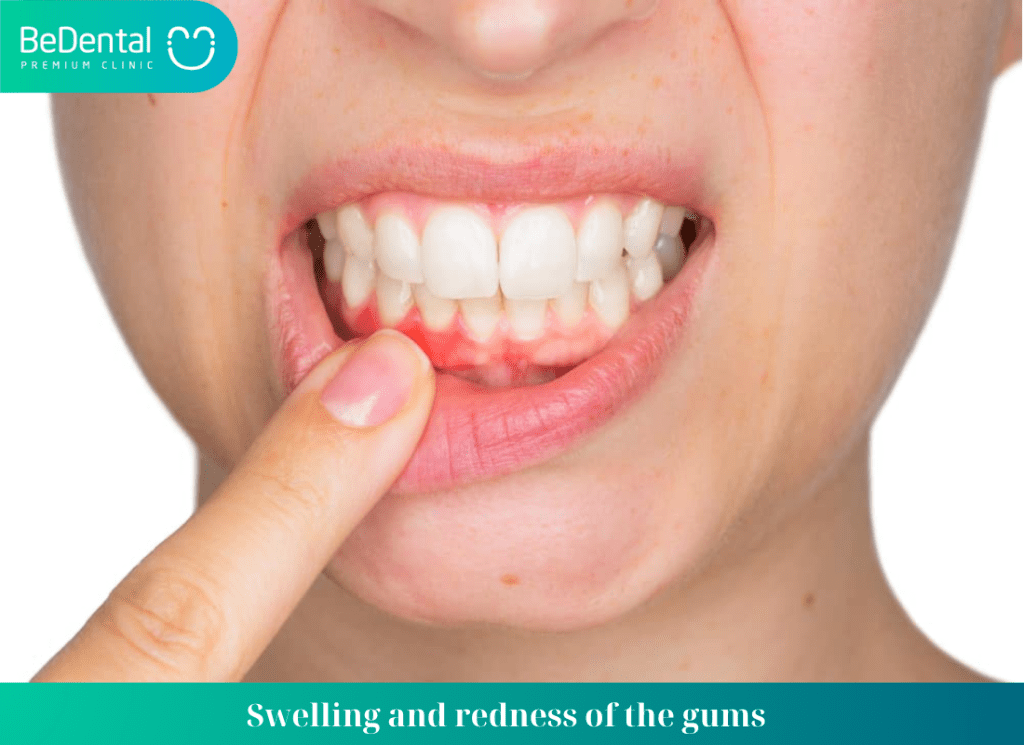
- Pus from the tooth roots: In some severe cases, an infected tooth pulp can lead to the formation of an abscess, causing pus to flow. Pus can flow from the tooth roots or form as a soft lump in the middle of the tooth roots.
- Bad breath: If bacteria from the mouth are infected from the tooth pulp, bad breath will occur.
If you have the above symptoms or suspect root canal inflammation, I recommend you see a dentist immediately. The dentist will examine and accurately diagnose your condition and provide appropriate treatment based on your current status and pregnancy.
Why do pregnant women often suffer from dental issues?
Pregnant women are more likely to suffer from dental and oral diseases for several reasons:
- Hormonal changes: During pregnancy, the body produces high levels of estrogen and progesterone hormones. Hormonal changes can increase blood flow to the gums and tooth roots, making them more susceptible to inflammation and infection. This can lead to swollen gums, gum disease, and gingivitis.
- Dietary changes: Pregnant women tend to eat more frequently and may consume unhealthy foods high in sugar and starch. This creates favorable conditions for bacteria that cause tooth decay and gum disease to thrive.
- Nausea and vomiting: Nausea and vomiting are common in the early stages of pregnancy and can lead to enamel erosion. Continuous vomiting can also increase the risk of tooth decay and gum inflammation.
- Improper oral care: During pregnancy, women may find it challenging to brush and care for their teeth due to discomfort, sensitivity, or nausea. Improper oral care can contribute to the development of dental issues.
To keep your mouth clean during pregnancy, pregnant women should follow these steps:
- Brush your teeth at least twice a day with a soft toothbrush and fluoride toothpaste.
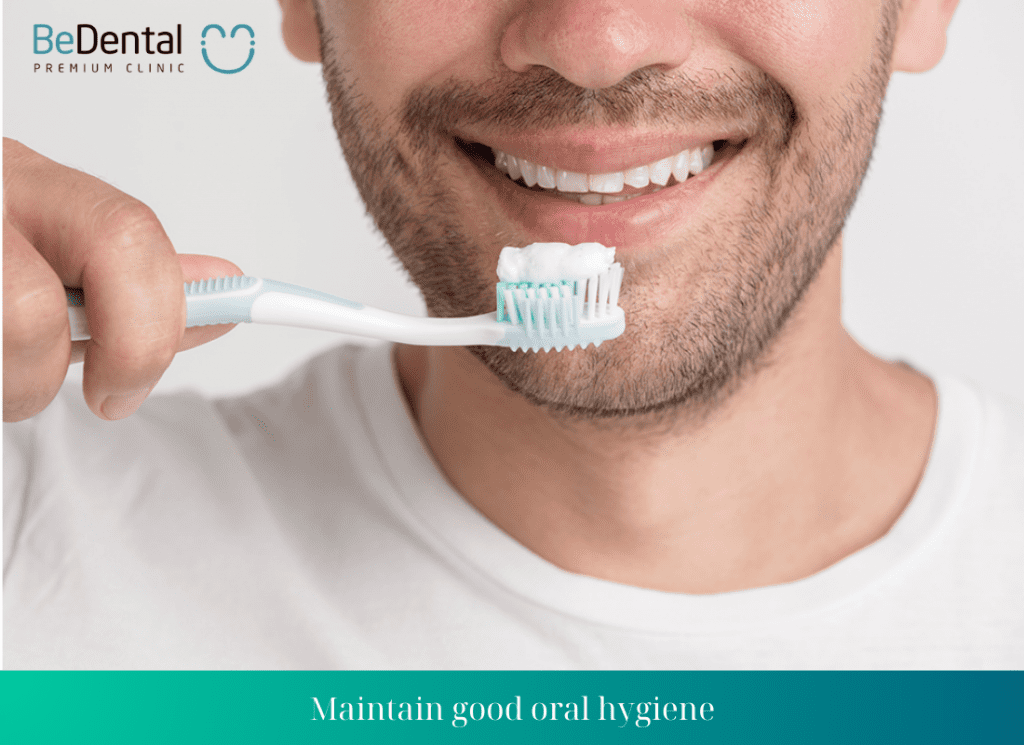
- Using dental floss helps clean without causing irritation.
- Limit contact with sugary and starchy foods.
- Adjust your diet to ensure an adequate intake of calcium and other essential minerals.
- Visit the dentist regularly for oral hygiene and cleaning.
- Discuss with your obstetrician and dentist to get appropriate advice for your specific situation.
Should pregnant women have root canal treatment? Consulting with a dentist and an obstetrician is necessary to protect oral health and the fetus during pregnancy.
Should pregnant women have root canal treatment?
Root canal treatment in pregnant women should be considered on a case-by-case basis. However, the final decision should be based on the advice and evaluation of a dentist and an obstetrician, considering the pregnant woman’s health status and benefits versus risks.
Should pregnant women have root canal treatment? In some cases, root canal treatment may be necessary if the tooth is severely damaged and causing pain or significantly impacting the overall health of the pregnant woman. Root canal treatment during pregnancy is usually performed under close monitoring and frequent supervision with the participation of an obstetrician to ensure safety for the fetus.
However, root canal treatment during pregnancy is often postponed until after the first trimester, especially within the first three months. This helps minimize the potential risks of anesthesia side effects.
Historically, dentists recommend treating dental issues between the fourth and sixth months of pregnancy as this is a suitable time for pregnant women to undergo dental treatment. At this point, the fetus is stable and adapted to the mother’s body, making it healthier than in the first three months.
For root canal treatment during pregnancy, X-rays are necessary to accurately assess the condition of the tooth pulp, but the small doses that penetrate the jawbone tissue to the area of the tooth needing treatment may not be safe for the fetus.
Root canal treatment during pregnancy also requires anesthesia injections, which contain substances that can be harmful to both the mother and the baby.
Therefore, for an effective plan for root canal treatment during pregnancy, expectant mothers should seek reputable dental clinics with highly skilled dentists who can diagnose and provide effective treatment methods. Additionally, it is essential not to attempt home remedies for tooth pulp inflammation during pregnancy but to maintain oral hygiene and rinse with a diluted saltwater solution to prevent inflammation.
Treating tooth pulp inflammation for pregnant women
Should pregnant women have root canal treatment? Pregnant women need special attention and assistance from healthcare professionals. Here are some ways to treat tooth pulp inflammation for pregnant women that a doctor may recommend:
- Antibiotics: In cases of severe infection, the doctor may prescribe safe antibiotics for pregnant women to eliminate the bacteria causing inflammation. However, antibiotic use during pregnancy should be closely monitored and guided by a doctor.
- Diagnosis and root canal treatment: If tooth pulp inflammation cannot be treated with antibiotics, the doctor may recommend diagnosing and treating the tooth pulp. This process typically involves removing the infected pulp and cleaning the blood vessels and surrounding tissues.
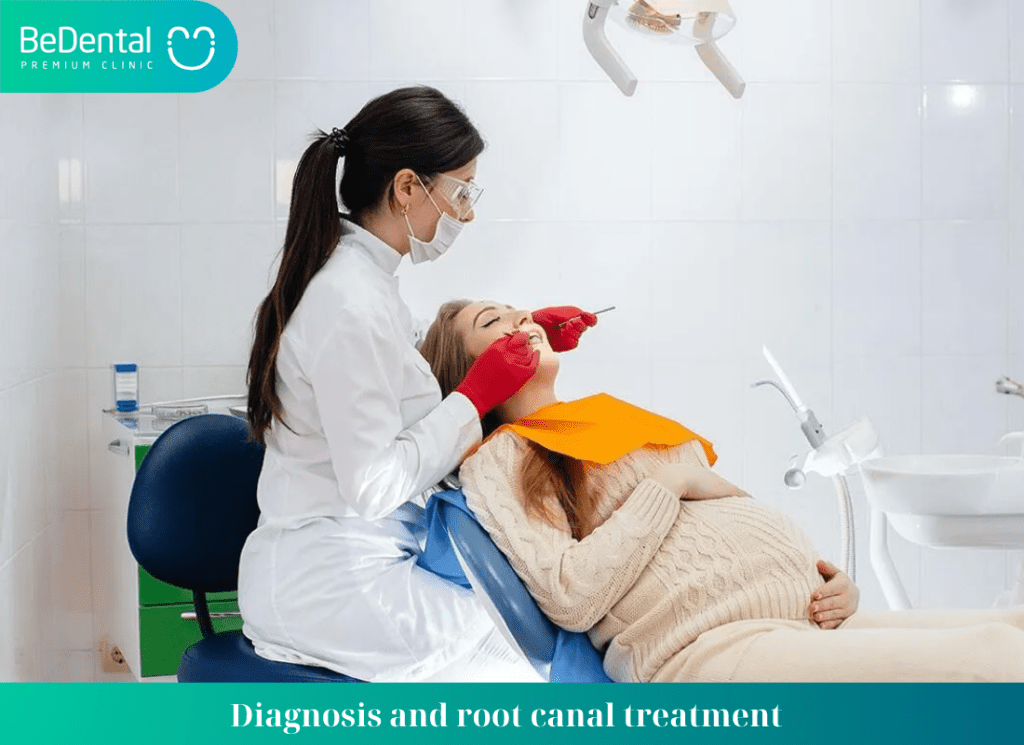
- Dental care alternatives: In some cases, the dentist may recommend additional dental treatments such as fillings or teeth whitening to eliminate inflammation symptoms and enhance overall oral health.
Most importantly, you should seek the advice of a dentist and an obstetrician. They will assess the condition of your teeth and consider issues related to pregnancy, medication, and the most suitable procedures for you.
What should pregnant women avoid eating after root canal treatment?
After undergoing root canal treatment, you will need to follow some dietary rules to support the smooth recovery process. Here are some dietary restrictions for pregnant women after root canal treatment:
- Avoid hot foods: Avoid contact with hot foods and drinks, as high temperatures can cause swelling, pain, and irritation after root canal treatment.
- Limit cold foods: Hot and cold beverages can also cause sensitivity and pain, so limit exposure to cold drinks during the recovery process.
- Avoid sticky, chewy foods: Avoid consuming sticky and chewy foods like gum or caramel candies to prevent spreading or irritation in the root canal area.
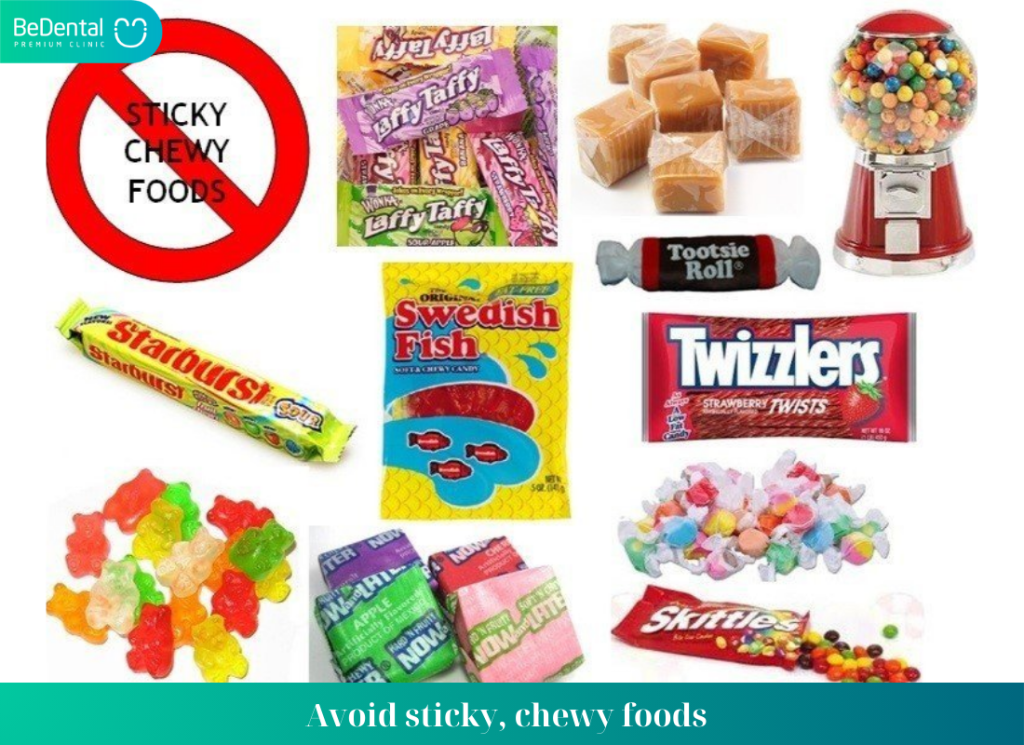
- Limit sweet and acidic foods: Sugar and acid can cause irritation and harm to the teeth and pulp. Limit exposure to foods and drinks containing sugar and acid, including soft drinks, soda, fruit juices, and orange juice.
- Stay hydrated: Ensure to drink plenty of water throughout the recovery period to maintain a fresh feeling and minimize the risk of infection.
Note that these are general recommendations and depend on your health condition. It is always best to consult with a dentist after root canal treatment to receive personalized advice to meet your nutritional needs.
Tips for pregnant women after root canal treatment:
After undergoing root canal treatment, mothers need to adhere to certain oral hygiene practices to ensure quick recovery of the teeth and avoid potential issues. Here are some tips for pregnant women after root canal treatment:
- Oral care: Brush your teeth at least twice a day with a soft toothbrush and fluoride toothpaste. Maintain daily oral hygiene, including brushing and flossing regularly to avoid infection and negative effects on the root canal area.
- Dietary restrictions: Avoid eating for a temporary period after root canal treatment to help the area heal. Avoid foods and drinks with high temperatures, sudden hot or cold, and avoid contact with cleaning agents or acids to prevent irritation and infection.
See more: Tips for eliminating bad breath
- Adjust your diet: Prioritize foods rich in calcium and minerals to promote the recovery of teeth and bones. Consult with an obstetrician or nutritionist for specific advice on a balanced diet during this period.
- Take medication as prescribed: If the dentist has prescribed medication after root canal treatment, make sure to take it as directed to prevent infection and pain after the procedure.
- Follow-up appointments: It is essential to adhere to follow-up and regular check-up appointments with the dentist to ensure a smooth recovery process and no underlying issues.
Bedental has answered questions about whether pregnant women should undergo root canal treatment, signs of pulpitis in pregnant women, tips for pregnant women after root canal treatment, and what pregnant women should avoid eating after root canal treatment. Visit Bedental for the best experience.
Tư vấn chuyên môn bài viết:
BÁC SĨ DƯƠNG THỊ THÙY NGA





